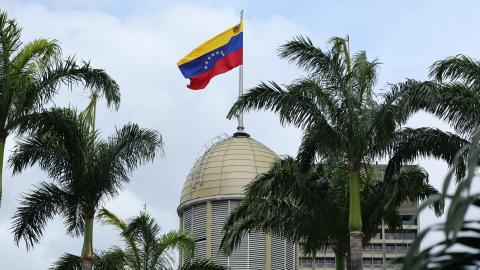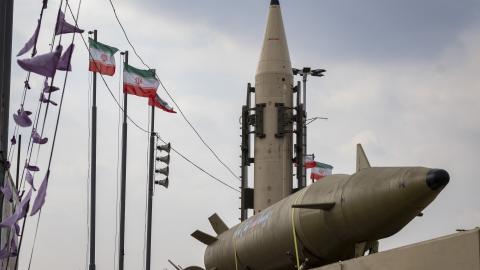For Christians--and many Muslims--the main reason to celebrate this Christmas is, of course, Jesus' birth. But there are also trends in the church worldwide that make this Advent season at once a time of especial hope and a time of great suffering and darkness.
In China, despite ongoing repression (in early December, 270 house-church pastors were arrested in the city of Linyi alone), Christianity is expanding at a rate that has few parallels in history. Estimates placing the total number at over 80 million are no longer considered outlandish. Similar growth has taken place in Africa, which is now majority Christian and is likely soon to have more Christians than any other continent.
In purely numerical terms, Christianity is the world's fastest growing religion. Two-thirds of Christians and four-fifths of active Christians live outside the West, so Christianity now may well be the world's largest non-Western religion.
But for probably hundreds of millions, Christmas is shadowed by pain and fear, since this is usually the peak season for anti-Christian attacks in Pakistan, India, Sudan, Nigeria, and beyond. It is also a time when the Chinese and Vietnamese governments are prone to arrest their unregistered believers.
Violence continues in Nigeria, where tens of thousands have died in conflicts around the spread of Islamic law. Nigerian Christians are also often the victims when others produce allegedly blasphemous drawings. During the 2006 "Danish cartoon riots," Muslims rioting in Borno State killed 65 and destroyed 57 churches and 250 businesses. Persecution continues in Laos, India, Iraq, Turkey, Ethiopia, Sudan, Belarus, and elsewhere. Some Christian leaders in Gaza have been murdered while others have had to flee. Even in Britain, newspapers are reporting threats to Muslim converts to Christianity: Many remain in hiding, and one has had to move 45 times.
Other examples could be given, but two of the worst, Burma and Eritrea, receive scant attention because their repressions do not fit any wider international political agendas, hence their victims are among the world's most forgotten people.
Burma made international news this year when, in August and September, thousands of courageous Buddhist monks led peaceful demonstrations against the military regime, which responded with mass killings, beatings, and arrests of monks. Equally brave democracy leader Aung San Suu Kyi, under house arrest, still gains some attention. But the regime's destruction of its ethnic and religious minorities seldom receives coverage, though it rivals that in Darfur.
The government's program of "Burmanization" includes not only privileges for ethnic Burmans but also promotion of Buddhism in the name of "national solidarity." The Religious Affairs Ministry is on the grounds of the World Peace Pagoda (Kaba Aye) in Rangoon, the residence for senior Buddhist monks. As shown by the Buddhist-led demonstrations this fall, this campaign is not conducted by true Buddhist leaders: They too are monitored and repressed. In a country where almost everyone is persecuted, however, the religious minorities are more so.
The minority ethnic groups have significant Christian, Muslim, and animist communities. The Chin, Kachin, and Karenni are about 90 percent Christian. The Naga have significant numbers of Christians, and the Karen are about 40 percent Christian. The government's ethnic and religious cleansing of these groups verges on the genocidal, including destruction of villages, land confiscation, forced labor, use of human minesweepers, and rape and torture--especially in the Karen, Shan, and Mon states. More than 150,000 people, predominantly Karen and Karennis, are in refugee camps on the Thai-Burma border. A further 200,000 Shan refugees are thought to be in Thailand without recognition or camp facilities. At least 1,000,000 people are internally displaced. Since 1996, the army has destroyed over 3,000 villages in eastern Burma.
This repression has specific religious elements. Mosque and church construction is forbidden. Christians are forced to engage in destruction of churches, and Muslims of mosques. On pain of death they are conscripted into forced labor, including building pagodas and monasteries. There is forced conversion. In Chin State unmarried Buddhist government soldiers have been encouraged, with offers of higher rank and privileges, to marry and convert Christian Chin women. Torture is widespread, with reports this fall of prisoners being roasted over fires.
A rival to Burma's brutality is Eritrea which, since its 1993 independence from Ethiopia, has maintained itself as a militarily mobilized national security state. Only four religious groups--Catholic, Evangelical Lutheran, and Orthodox Christianity, and Sunni Islam--are allowed. Adherents of other faiths are viciously attacked, especially Pentecostals and other evangelicals. In compulsory military service, Bible reading and prayer are banned. Violators may be imprisoned and required to sign statements renouncing their belief as a condition of release. In one instance parents were asked to sign a document stating that their children would be liable to execution if taking part in forbidden religious activities. Unauthorized meetings of more than seven are forbidden: Entire wedding parties have been arrested.
The number of imprisoned evangelicals is probably over 2,000, some 10 percent of the country's total. Incarceration is brutal, with underground cells or metal shipping containers serving as especially severe punishment cells. The Bada detention center is more than 200 feet below sea level and can have temperatures over 130 degrees. People die or go insane. In one incident in 2003, 57 teenagers found with Bibles at a summer military camp were held jailed in metal containers to force them to abandon their faith, and all but six died. In 2005, 161 young people were killed attempting to flee the harsh conditions.
Torture is commonplace, especially tying prisoners in painfully contorted positions for hours or days at a time. In October 2006, two Christians, Immanuel Andegergesh and Kibrom Firemichel, were tortured to death in a military camp. In February of this year, Magos Solomon Semere died under torture at the Adi-Nefase Military Confinement facility outside Assab. On September 5, a 33-year-old woman, Nigisti Haile, was tortured to death at the Wi'a Military Training Center for refusing to recant her Christian faith.
For those who celebrate Christmas and those who do not, this season is an excellent time to remember these and other forgotten people of the world. And New Year's is a good time to resolve that they shall be less forgotten.














